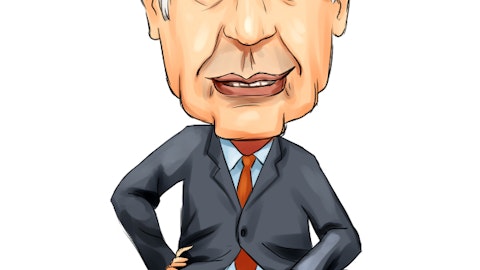Shareholder activism has been on a surge following the aftermath of the financial crisis and is anticipated to keep expanding despite the somewhat disappointing performance delivered in 2015. The recent stock market sell-off has impacted activist hedge funds quite strongly, which led many analysts and investors conclude that pure-play activist investment vehicles might not survive bear markets. Truth be told, it would be quite hard for activists to turn around troubled companies amid worsening economic conditions and constantly falling equity prices. Although the number of activist campaigns may slow down amid increased volatility and uncertainty in equity markets at the moment, constructive and long term-oriented shareholder activism will most likely keep intensifying in the upcoming years given their perceived benefits and high returns. Having said that, the following article will digest four 13D filings submitted with the SEC by widely-known, as well as less known, activist hedge funds.
Through extensive research, we determined that imitating some of the picks of hedge funds and other institutional investors can help generate market-beating returns over the long run. The key is to focus on the small-cap picks of these investors, since they are usually less followed by the broader market and are less price-efficient. Our backtests that covered the period between 1999 and 2012, showed that following the 15 most popular small-caps among hedge funds can help a retail investor beat the market by an average of 95 basis points per month (see more details here).
According to a newly-amended 13D filing, Robert Joseph Caruso’s Select Equity Group L.P. owns 3.39 million shares of Shake Shack Inc. (NYSE:SHAK), which represent 8.9% of the company’s outstanding common stock. SEG owned nearly 2.44 million shares of Shake Shack at the end of December 2015, as revealed in the fund’s 13F filing for the fourth quarter. Shake Shack Inc. (NYSE:SHAK) operates and licenses Shake Shack restaurants, which are “roadside” burger stands serving hamburgers, hot dogs, crinkle-cut fries, and other products. There were 75 Shacks in operation at the end of September 30, of which 41 were domestic company-operated, five were licensed in the United States and 29 were licensed in other countries around the globe. Moreover, the company completed nine system-wide Shack openings during the fourth quarter of 2015 and plans to open at least 13 new domestic company-operated Shacks in 2016. Shake Shack’s 2015 total revenue grew by 60.8% year-on-year to $190.6 million, while Shack sales in particular increased 63.5% to $183.2 million. It should be noted that same-Shack sales growth achieved a rate of 13.3% in 2015, a rate that is significantly above the company’s expectations for 2016. Investors and analysts believe Shake Shack’s management is being quite conservative with its 2016 guidance, as it anticipates same-Shack sales to grow in the range of 2.5% to 3.0%. It appears that the freshly-revealed disappointing guidance for 2016 put some weight on Shake Shack’s stock, which is down by 13% year-to-date. Philippe Laffont’s Coatue Management acquired a new stake of 153,138 shares in Shake Shack Inc. (NYSE:SHAK) during the December quarter.
Follow Shake Shack Inc. (NYSE:SHAK)
Follow Shake Shack Inc. (NYSE:SHAK)
Receive real-time insider trading and news alerts
The next two pages of this article discuss the remaining three SEC filings submitted by Elliott Management and other hedge fund vehicles.
In a new Schedule 13D filing, Carl Icahn’s Icahn Capital L.P. disclosed owning 10.58 million shares of Manitowoc Foodservice Inc. (NYSE:MFS), which account for 7.73% of the company’s total outstanding shares. These shares were received in connection with the separation of Manitowoc Company Inc. (NYSE:MTW)’s Crane and Foodservice businesses into two independent, publicly-traded companies. Earlier this month, Manitowoc Company Inc. (NYSE:MTW) completed the tax-free spin-off of Manitowoc Foodservice, pursuant to which MTW shareholders received one share of MFS for each share of MTW common stock owned. Icahn Capital L.P. had in possession 10.58 million shares of Manitowoc Company Inc. (NYSE:MTW) at the end of December 2015, so the activist investment firm received the same number of MFS shares following the separation. The post-separation Manitowoc Foodservice Inc. (NYSE:MFS) represents a leading commercial foodservice equipment company, which manufactures and services an integrated portfolio of hot and cold category products. The company supplies its foodservice equipment to both commercial and institutional operators, including full-service restaurants, quick-service restaurant chains, hotels, to name just a few. Just recently, Robert W. Baird initiated coverage on Manitowoc Foodservice with an ‘Outperform’ rating.
Follow Welbilt Inc. (NYSE:WBT)
Follow Welbilt Inc. (NYSE:WBT)
Receive real-time insider trading and news alerts
As revealed by a freshly-amended 13D filing, Paul Singer’s Elliott Associates L.P. and its affiliates have collective economic exposure to around 13.2% of American Capital Ltd. (NASDAQ:ACAS). This economic exposure includes 12.48 million shares of common stock, as well as additional economic exposure to 8.0% of outstanding common stock in the form of cash-settled swaps with respect to 19.05 million shares. The activist investor’s entities had combined economic exposure to American Capital of roughly 11.9% in January 2016 (12.48 million shares of common stock and economic exposure in the form of cash settled swaps with respect to 18.80 million shares), as revealed in the fund’s previous 13D filing on the company. Earlier this year, the business development company (BDC), that primarily invests in senior and mezzanine debt and equity in buyouts of private companies, announced that its Board of Directors completed the initial phase of its previously-announced review process and authorized the solicitation of offers to purchase the entire company or its business lines separately. The BDC’s consolidated net asset value (NAV) per share was $19.88 on December 31, while American Capital Ltd. (NASDAQ:ACAS)’s shares are currently trading 27% below that value. Therefore, the sale of the entire company or its individual business lines will most likely disentangle locked up shareholder value. American Capital Chief Executive Officer and Chairman recently said that “our business lines and assets have tremendous value, which is not reflected in our current share price”. Anothony Bozza’s Lakewood Capital Management owns 6.37 million shares of American Capital Ltd. (NASDAQ:ACAS) as of December 31.
Follow American Capital Ltd (NASDAQ:ACAS)
Follow American Capital Ltd (NASDAQ:ACAS)
Receive real-time insider trading and news alerts
Let’s conclude our discussion with a recent filing submitted by the hedge fund firm managed by Carl Icahn’s protégée, Mark Rachesky. According to an amended 13D filing, MHR Fund Management currently owns 8.54 million shares of Loral Space & Communications Ltd. (NASDAQ:LORL), which constitute 39.9% of the company’s total shares. This is up from the stake of 8.13 million shares disclosed in MHR’s quarterly 13F for the fourth quarter of 2015. Loral Space & Communications Ltd. (NASDAQ:LORL) is a satellite communications company, whose satellite services operations entirely rely on its 62.8% economic interest in Canadian satellite communications company Telesat Holdings. It should be noted that the Public Sector Pension Investment Board (PSP) has far less economic interest in Telesat, but owns 29.4% of the voting interests for directors and 67.3% of the voting interest for all other matters. Mark Rachesky and his team has been trying for quite some time to assist Loral Space & Communications in selling its main asset, Telesat Holdings, to PSP, but has failed to achieve that goal thus far. Inan Dogan, the founder of Insider Monkey, recently discussed the whole story around the troubled Loral Space & Communications in more detail (read the details here). James Dondero’s Highland Capital Management had 2.12 million shares of Loral Space & Communications Ltd. (NASDAQ:LORL) in its portfolio at the end of 2015.
Follow Loral Space & Communications Inc. (NASDAQ:LORL)
Follow Loral Space & Communications Inc. (NASDAQ:LORL)
Receive real-time insider trading and news alerts
Disclosure: None



